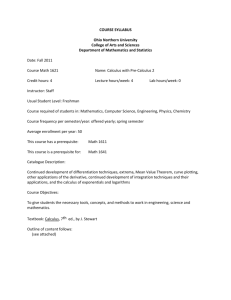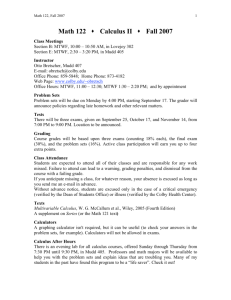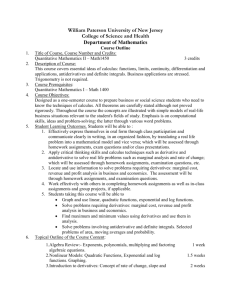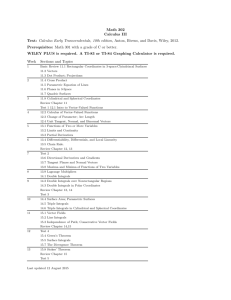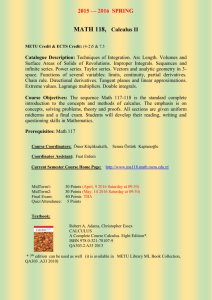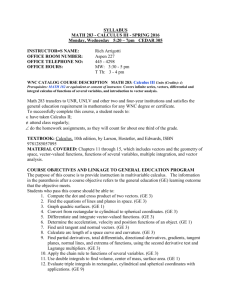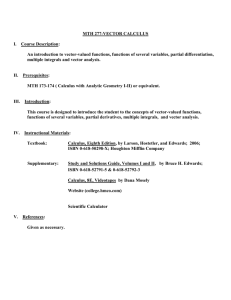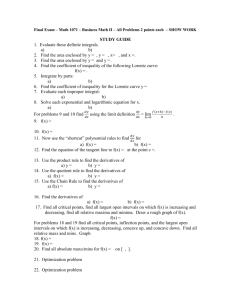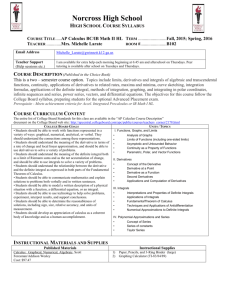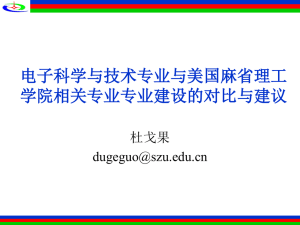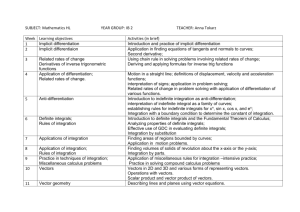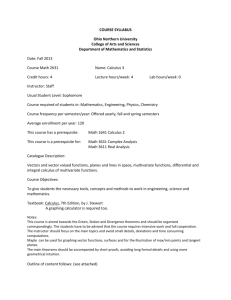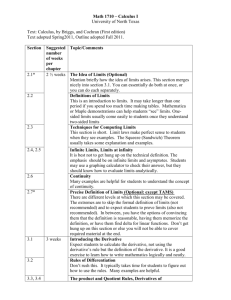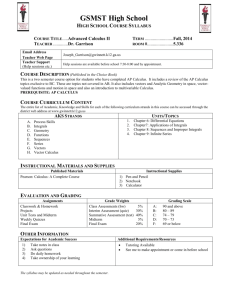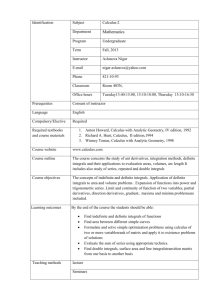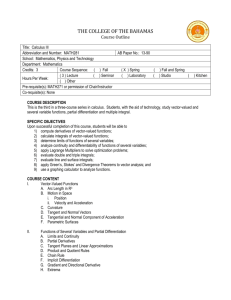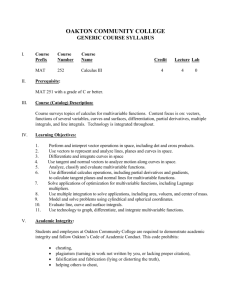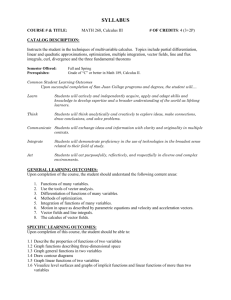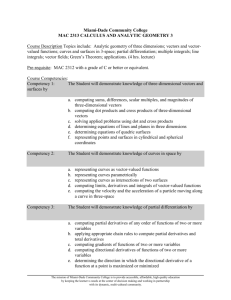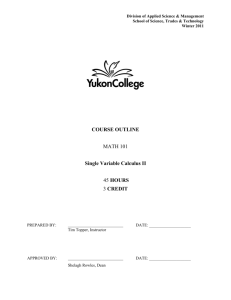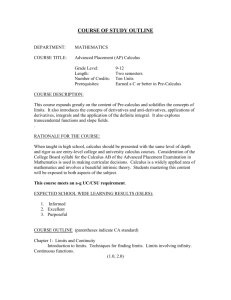Southern Arkansas University Course Syllabus Fall 2013 Course
advertisement
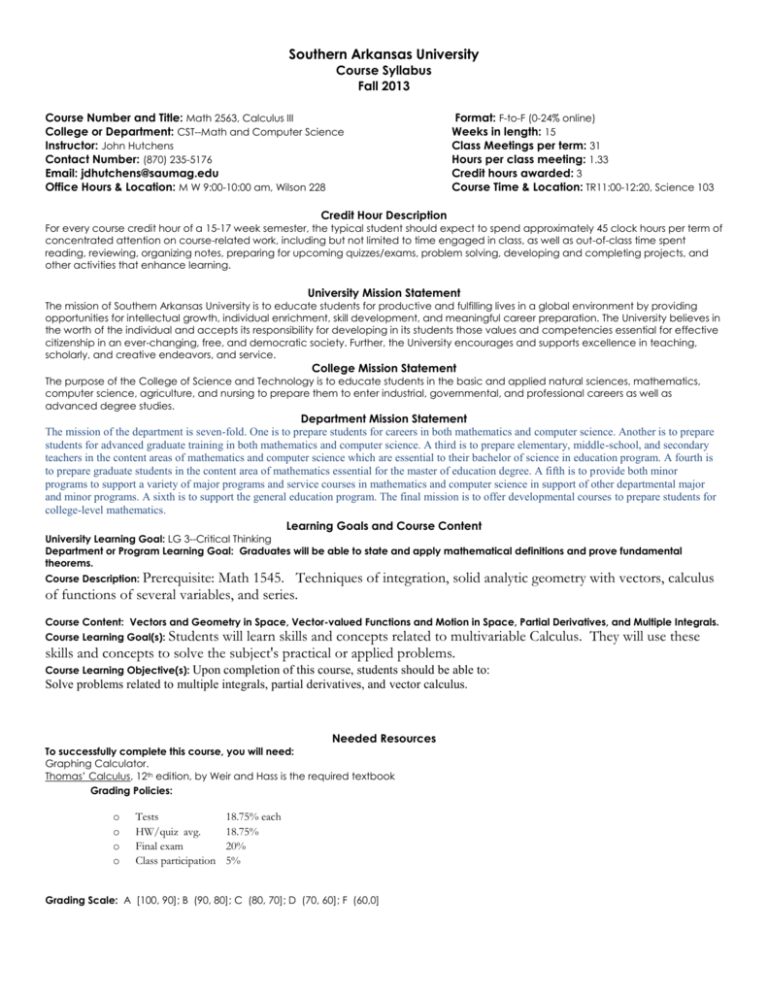
Southern Arkansas University Course Syllabus Fall 2013 Course Number and Title: Math 2563, Calculus III College or Department: CST--Math and Computer Science Instructor: John Hutchens Contact Number: (870) 235-5176 Email: jdhutchens@saumag.edu Office Hours & Location: M W 9:00-10:00 am, Wilson 228 Format: F-to-F (0-24% online) Weeks in length: 15 Class Meetings per term: 31 Hours per class meeting: 1.33 Credit hours awarded: 3 Course Time & Location: TR11:00-12:20, Science 103 Credit Hour Description For every course credit hour of a 15-17 week semester, the typical student should expect to spend approximately 45 clock hours per term of concentrated attention on course-related work, including but not limited to time engaged in class, as well as out-of-class time spent reading, reviewing, organizing notes, preparing for upcoming quizzes/exams, problem solving, developing and completing projects, and other activities that enhance learning. University Mission Statement The mission of Southern Arkansas University is to educate students for productive and fulfilling lives in a global environment by providing opportunities for intellectual growth, individual enrichment, skill development, and meaningful career preparation. The University believes in the worth of the individual and accepts its responsibility for developing in its students those values and competencies essential for effective citizenship in an ever-changing, free, and democratic society. Further, the University encourages and supports excellence in teaching, scholarly, and creative endeavors, and service. College Mission Statement The purpose of the College of Science and Technology is to educate students in the basic and applied natural sciences, mathematics, computer science, agriculture, and nursing to prepare them to enter industrial, governmental, and professional careers as well as advanced degree studies. Department Mission Statement The mission of the department is seven-fold. One is to prepare students for careers in both mathematics and computer science. Another is to prepare students for advanced graduate training in both mathematics and computer science. A third is to prepare elementary, middle-school, and secondary teachers in the content areas of mathematics and computer science which are essential to their bachelor of science in education program. A fourth is to prepare graduate students in the content area of mathematics essential for the master of education degree. A fifth is to provide both minor programs to support a variety of major programs and service courses in mathematics and computer science in support of other departmental major and minor programs. A sixth is to support the general education program. The final mission is to offer developmental courses to prepare students for college-level mathematics. Learning Goals and Course Content University Learning Goal: LG 3--Critical Thinking Department or Program Learning Goal: Graduates will be able to state and apply mathematical definitions and prove fundamental theorems. Course Description: Prerequisite: Math 1545. Techniques of integration, solid analytic geometry with vectors, calculus of functions of several variables, and series. Course Content: Vectors and Geometry in Space, Vector-valued Functions and Motion in Space, Partial Derivatives, and Multiple Integrals. Course Learning Goal(s): Students will learn skills and concepts related to multivariable Calculus. They will use these skills and concepts to solve the subject's practical or applied problems. Course Learning Objective(s): Upon completion of this course, students should be able to: Solve problems related to multiple integrals, partial derivatives, and vector calculus. Needed Resources To successfully complete this course, you will need: Graphing Calculator. Thomas’ Calculus, 12th edition, by Weir and Hass is the required textbook Grading Policies: o o o o Tests HW/quiz avg. Final exam Class participation 18.75% each 18.75% 20% 5% Grading Scale: A [100, 90]; B (90, 80]; C (80, 70]; D (70, 60]; F (60,0] Additional University Policies Disability Support Services: It is the policy of SAU to accommodate students with disabilities, pursuant to federal law, state law, and the University's commitment to equal education opportunities. Any student with a disability who needs accommodation should inform the instructor at the beginning of the course. Students with disabilities are also encouraged to contact the Office of Disabilities Support Services, Nelson Hall, Room 203, 870-235-4154. Academic Integrity Policy: Academic integrity at SAU is an organizational and individual responsibility to honesty in all learning experiences. Any act of dishonesty in academic work constitutes academic misconduct and is subject to disciplinary action. Acts of dishonesty include, but are not limited to: A. Plagiarism--the act of taking and/or using the ideas, work, and/or writings of another person as one’s own. B. Cheating--an act of dishonesty with the intention of obtaining and/or using information in a fraudulent manner. C. Fabrication--faking or forging a document, signature or findings of a research project. Supplemental Information The following calendar is subject to change: Course Calendar TEST 1 TEST 2 TEST 3 Topic 3D coordinates Vectors The dot product 12 The cross product Lines and planes Cylinders and quadrics TEST 1 Curves in space Integrals of vector functions 13 Arc length Curvature and normal vectors Function of several variables Limits and continuity Partial derivatives TEST 2 14 The chain rule Directional derivatives Tangent planes Extreme values Double integrals Double integrals (cont.) 15 Area Triple integrals Antiderivatives TEST 3 Line integrals Vector fields Final Exam: Thursday December 10, 10:00am – 11:50 am Hours 1 1 1 1 2 1 1 1 1 2 1 1 3 2 1 1 1 2 2 1 1 2 2 2
